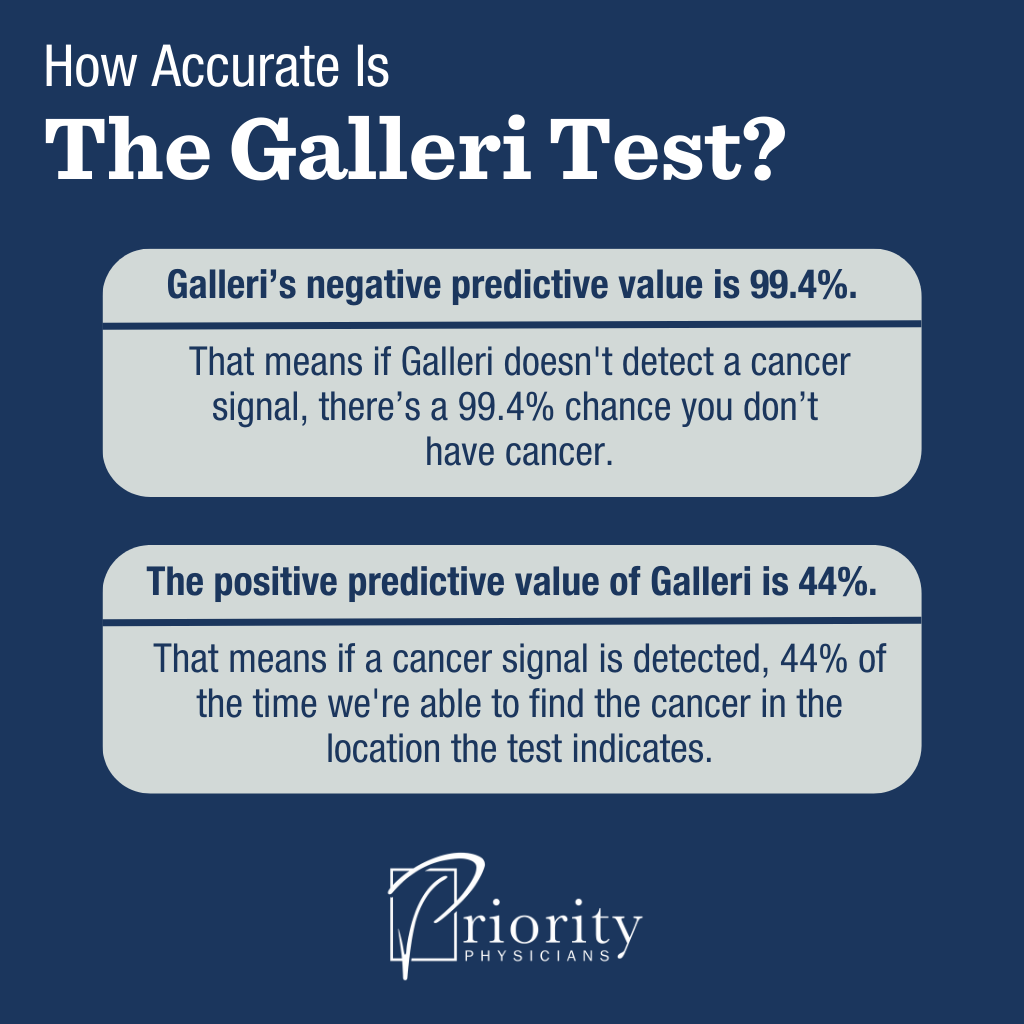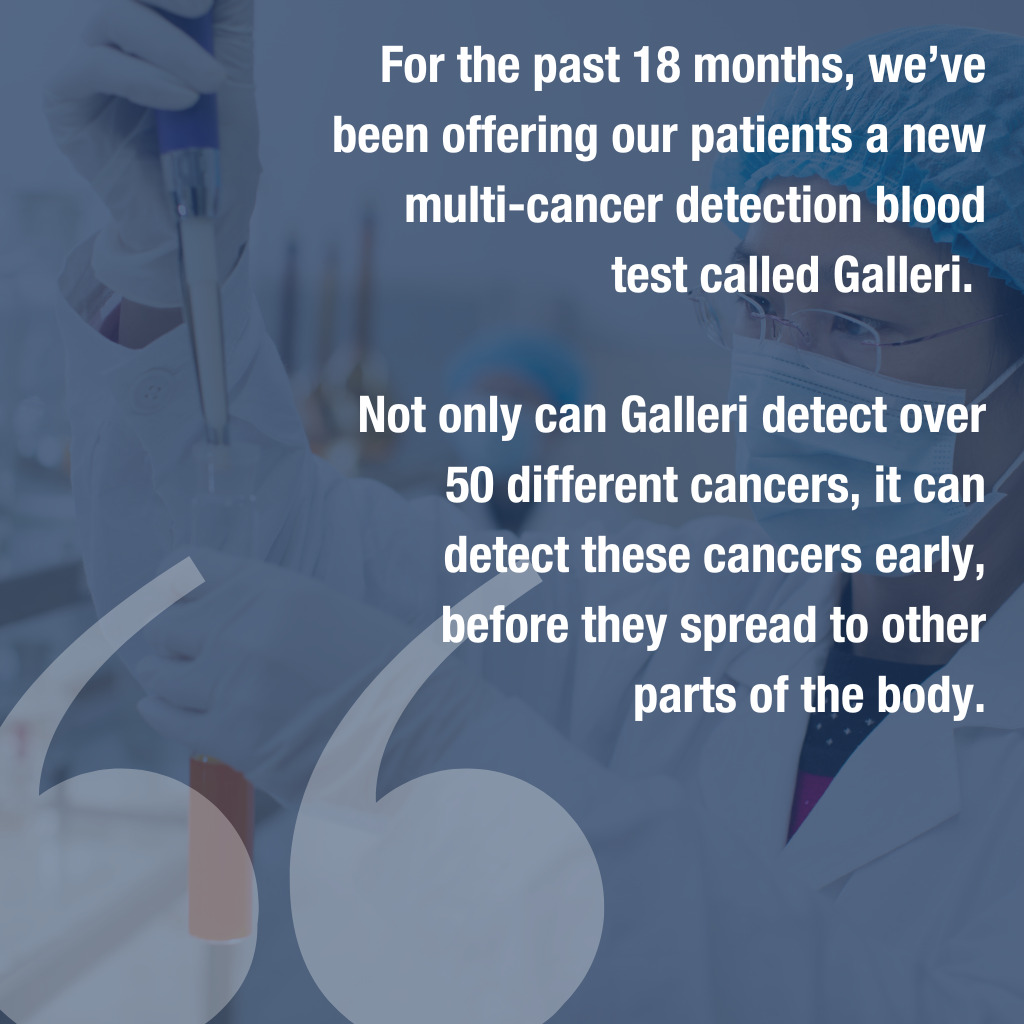Aggressive cancer can strike quickly.
Although we’ve had good screening tests for lung, colon, breast, cervical, prostate, and skin cancers, these cancers only make up about 30% of the cancers that kill over 600,000 Americans every year. Doctors haven’t had any good way to detect the other 70% of cancers early — until now.
Priority Physicians is proud to be the first outpatient practice in Indiana to offer the latest technology in early cancer detection.
The Galleri Test
For the past 18 months, we’ve been offering our patients a new multi-cancer detection blood test called Galleri by GRAIL. Not only can Galleri detect over 50 different cancers, it can detect these cancers early, before they spread to other parts of the body.
This technology is so new that it warrants a bit of a science lesson.
Unlike prior tests, which look for cancer once it’s become visible, Galleri looks for the DNA that cancer cells release into the bloodstream as they grow. This “cell-free” DNA is collected in a blood sample, and genes are sequenced using state-of-the-art machinery.
The sequencing allows us to determine which genes are “turned on” and which are “turned off” in any given sample of DNA that is sequenced. The DNA of all cancer cells shows similar patterns in which growth genes and tumor-suppressor genes are turned on and off respectively.
We then use artificial intelligence to compare the patterns of these DNA snippets to a database of hundreds of thousands of patients who have known cancer diagnoses, as well as to the DNA of healthy patients. The result is our first screening tool for the 50+ cancers that currently have no recommended screening protocol.
Equally important, Galleri can help us identify cancers in their earliest stages. We know diagnosing cancer early is the linchpin in our ability to cure it. Most cancers are curable if diagnosed at stage 1 or stage 2 (before they have spread). Stage 3 cancers that have spread to the lymph nodes and stage 4 cancers that are widely metastatic have a much poorer prognosis. They account for the lion’s share of cancer deaths.
The Galleri screening test was designed for patients age 50 and over, as well as younger patients with an elevated risk for cancer (family history, personal history, etc.). The current recommendation is that this screening test be performed on a yearly basis, and many of our patients have already added it to their annual lab work.

Frequently Asked Questions
Can Galleri identify where in the body a suspected cancer is?
Yes. In addition to showing a cancer signal, the DNA pattern also gives us a strong signal as to which tissue the cancer is likely to have originated from. This gives us a great head start when looking for cancer in a patient with a positive cancer signal.
How accurate is the Galleri test?
When speaking about the accuracy of any test, we talk about the positive and negative predictive value. The negative predictive value is the percent chance, out of 100, that a negative test is truly negative.
Galleri’s negative predictive value is 99.4%. That means if Galleri does not detect a cancer signal, there’s a 99.4% chance you don’t have cancer. For a screening test, this is a fantastic negative predictive value!
The positive predictive value of Galleri is 44%. That means if a cancer signal is detected, 44% of the time we’re able to find the cancer in the location the test indicates. For those patients in whom we can’t initially find the cancer, we institute a program of regular follow-up tests for the next several years.
Sometimes the test is wrong, but other times, the test is likely picking up the cancer on a molecular level before it can be seen with imaging techniques such as CT or MRI. That’s why we monitor these patients closely throughout the following years. We also typically repeat the cancer screening at six months, free of charge, to determine whether the cancer signal is still present.
Galleri’s positive predictive value is 44%. Is that good for a screening test?
The short answer is yes.
By comparison, the positive predictive value of a screening mammogram is 4%. That means that out of 100 abnormal screening mammogram results, we find four breast cancers.
We still recommend mammograms because the consequences of missing early breast cancer are so dire, but compared to mammograms, this new Galleri cancer screen is 10 times more effective at detecting cancer.
If I do this test, can I skip my mammograms, lung scans, and colonoscopy?
Unfortunately, no. Galleri does not replace any other recommended cancer screening.
It has been proven, however, that adopting Galleri nationally would lead to twice as many early cancer diagnoses compared to current screening guidelines.
Is this test covered by insurance?
As of this writing, Galleri is not covered by insurance. The cost of the test is $950, and it can be paid for by an HSA or FSA.
There is currently a very large three-year study of 300,000 patients being conducted in Great Britain through their National Health Service. The goal is to prove to the British government that this type of testing not only saves lives, but also saves their healthcare system money.
Hopefully, once this data is released, Medicare will consider covering the test.

Galleri: Final Thoughts
We at Priority Physicians are proud to offer this cutting-edge technology to our patients. If you’d like to include Galleri in your annual lab work, reach out to any of our physicians. We’ll be happy to help you.

